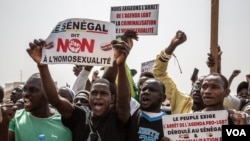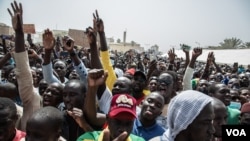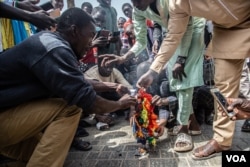A group of men gathered around a burning gay flag in Dakar Sunday and chanted: “Senegal will never accept homosexuality.” Others held signs that read: “Senegal says no to homosexuality” and “We demand an end to the LGBT agenda.”
They were among the thousands that flocked to Place de l’Obélisque to call for harsher penalties for sexual minorities, often referred to as LGBTQ (lesbian, gay, bisexual, transgender, questioning or queer) people.
The event was organized by ultra-conservative Muslim groups who say homosexuality is being imposed on them by the West and threatens their traditional values.
LGBTQ people and numerous medical associations contend that sexual orientation and gender identity are innate and cannot be "imposed" or changed. A U.N. panel in 2018 flatly rejected the notion that homosexuality is a Western phenomenon, writing: "Lesbian, gay, bisexual and transgender people exist everywhere, in all countries, among all ethnic groups... . Claims that same-sex attraction and transgender identity are Western are false."
Senegal is a 95% Muslim country that already prohibits any “indecent or unnatural acts between individuals of the same sex,” as is written in the penal code. Offenders can be punished with up to five years in prison and a fine of between 100,000 to 1,500,000 CFA – about $2,500.
Some anti-gay activists want even harsher penalties against sexual minorities, up to 10 years in prison.
A proposed bill that would have increased the prison sentence for homosexual acts to between five and ten years was rejected by lawmakers in January.
“We simply want the government to criminalize homosexuality just like they criminalized rape, like they criminalized cattle theft,” said Ngoné Dia, a university student. Dia heads the women's department at And Samm Jikko Yi, the collective of Islamic associations that organized the event. From Wolof, the name translates to: “Together for the Safeguarding of Values.”
“We want them to be imprisoned, even if it’s forever,” she said. “Senegal is a homophobic country and we’re proud to say it.”
Homosexuality is criminalized in more than half of African countries. Many of these laws date back to colonial times, when British and Arab communities brought with them anti-homosexual values.
But anthropologists have found evidence of homosexuality throughout pre-colonial Africa.
In Senegal, for example, the góor-jigéen, meaning “man-woman” in Wolof, used to be an accepted and even celebrated community in Senegalese society.
In 1935, English anthropologist Geoffrey Gorer wrote: “They do not suffer in any way socially… on the contrary, they are sought after as the best conversationalists and the best dancers.”
Fast forward to today and the Senegalese see homosexuality as a Western import.
“The Europeans, they mistreated our grandparents with slavery. But now the African youth, we’re awake, we know what we want and it’s now our turn to make our own decisions,” said Ibrahima Cisse, a construction worker who attended Sunday’s rally.
He held a sign in Wolof that translates to: “If you catch a homosexual, kill them.”
“Westerners need to understand that this is Africa, this is Senegal, and they should keep their problems to themselves. We don’t want that here,” he said. “I’m not alone – all of Senegal is against this. So if they show themselves, all of Senegal will kill them.”
Cisse said he hadn’t yet killed any gays, but was prepared to do so in the event he found one.
When visiting Senegal, some Western leaders have urged local lawmakers to ease restrictions on sexual minorities.
During a 2020 visit with Senegal’s president Macky Sall, for example, Canada’s Justin Trudeau made headlines when he raised the issue of the criminalization of homosexuality.
Sall later told journalists that “we’re comfortable with our laws.”
In its 2020 global human rights report, the U.S. State Department criticized Senegal for “violence against lesbian, gay, bisexual, transgender or intersex persons” and the “existence or use of laws criminalizing consensual same-sex sexual conduct between adults.”
Last May, And Samm Jikko Yi, the Muslim collective, held a demonstration similar to Sunday’s rally that also drew thousands of protesters. In the weeks that followed, LBGTQ activists reported a rise in assaults.
In addition to physical persecution, sexual minorities in Senegal also face difficulties finding employment, said Souleyman Diouf, the president and founder of the LGBTQ rights group Free Senegal. Diouf identifies as bisexual and uses a fake name to protect his identity.
He says he survived two assassination attempts, which led him seek refuge in France. But he still receives messages from people who threaten his infant daughter who is still in Senegal.
The problem is that the youth are being radicalized by terrorist organizations whose influence has spread rapidly throughout the Sahel, he said.
“I risk being assassinated, I maybe risk being assassinated in Europe. It’s just a matter of time for people like me,” he said. “But that won’t stop us from raising our voices to say that what’s happening in Senegal falls within the framework of terrorism – not, in fact, within the framework of a major religion."
If Senegal continues down this path, he said, sexual minorities could face genocide.
“It’s unfortunate,” he said. “It’s very unfortunate.”







